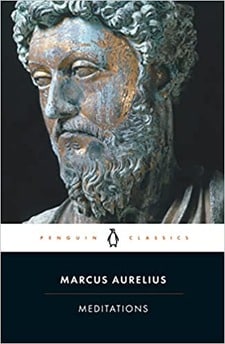“If someone can prove me wrong and show me my mistake in any thought or action, I shall gladly change. I seek the truth, which never harmed anyone: the harm is to persist in one’s own self-deception and ignorance.”
Marcus Aurelius, Meditations (Page 50)
“The best revenge is not to be like your enemy.”
Marcus Aurelius, Meditations (Page 46)
“Things of themselves cannot touch the soul at all. They have no entry to the soul, and cannot turn or move it. The soul alone turns and moves itself, making all externals presented to it cohere with the judgements it thinks worthy of itself.”
Marcus Aurelius, Meditations (Page 41)
“Your mind will take on the character of your most frequent thoughts: souls are dyed by thoughts.”
Marcus Aurelius, Meditations (Page 41)
“Think always of the universe as one living creature, comprising one substance and one soul: how all is absorbed into this one consciousness; how a single impulse governs all its actions; how all things collaborate in all that happens; the very web and mesh of it all.”
Marcus Aurelius, Meditations (Page 31)
“No action should be undertaken without aim, or other than in conformity with a principle affirming the art of life.”
Marcus Aurelius, Meditations (Page 23)
“If you set yourself to your present task along the path of true reason, with all determination, vigour, and good will: if you admit no distraction, but keep your own divinity pure and standing strong, as if you had to surrender it right now; if you grapple this to you, expecting nothing, shirking nothing, but self-content with each present action taken in accordance with nature and a heroic truthfulness in all that you say and mean—then you will lead a good life. And nobody is able to stop you.”
Marcus Aurelius, Meditations (Page 21)
“Failure to read what is happening in another’s soul is not easily seen as a cause of unhappiness: but those who fail to attend to the motions of their own soul are necessarily unhappy.”
Marcus Aurelius, Meditations (Page 12)
“Say to yourself first thing in the morning: today I shall meet people who are meddling, ungrateful, aggressive, treacherous, malicious, unsocial. All this has afflicted them through their ignorance of true good and evil. But I have seen that the nature of good is what is right, and the nature of evil what is wrong; and I have reflected that the nature of the offender himself is akin to my own—not a kinship of blood or seed, but a sharing in the same mind, the same fragment of divinity. Therefore I cannot be harmed by any of them, as none will infect me with their wrong. Nor can I be angry with my kinsman or hate him. We were born for cooperation, like feet, like hands, like eyelids, like the rows of upper and lower teeth. So to work in opposition to one another is against nature: and anger or rejection is opposition.”
Marcus Aurelius, Meditations (Page 10)
“Men seek retreats for themselves—in the country, by the sea, in the hills—and you yourself are particularly prone to this yearning. But all this is quite unphilosophic, when it is open to you, at any time you want, to retreat into yourself. No retreat offers someone more quiet and relaxation than that into his own mind, especially if he can dip into thoughts there which put him at immediate and complete ease: and by ease I simply mean a well-ordered life. So constantly give yourself this retreat, and renew yourself. The doctrines you will visit there should be few and fundamental, sufficient at one meeting to wash away all your pain and send you back free of resentment at what you must rejoin.”
Marcus Aurelius, Meditations (pag xxxv)
“For Marcus [Aurelius] philosophy was the therapy of the soul. In this sense, his Meditations are his medications.”
Diskin Clay, via Meditations (pag xxxiii)
“For a philosopher seeking to guide himself repetition is a philosophical virtue. Repetition is a form of spiritual exercise designed to reinforce the main principles of Marcus [Aurelius]’ philosophy; its purpose is to effect a ‘dyeing of the soul.'”
Diskin Clay, via Meditations (pag xviii)
Meditations [Book]

Book Overview: Written in Greek by an intellectual Roman emperor without any intention of publication, the Meditations of Marcus Aurelius offer a wide range of fascinating spiritual reflections and exercises developed as the leader struggled to understand himself and make sense of the universe. Spanning from doubt and despair to conviction and exaltation, they cover such diverse topics as the question of virtue, human rationality, the nature of the gods and the values of leadership. But while the Meditations were composed to provide personal consolation, in developing his beliefs Marcus also created one of the greatest of all works of philosophy: a series of wise and practical aphorisms that have been consulted and admired by statesmen, thinkers and ordinary readers for almost two thousand years.
“No one is perfect. We all have bad days. It’s okay to feel a little discouraged. But to give up? To not even try? That is criminal. ‘Disgraceful,’ Marcus Aurelius would say, ‘for the soul to give up when the body is still going strong.’ All of us have fallen short in the last year…and the years before that. We broke our resolutions. We made the same mistakes again and again. We were ‘jarred, unavoidably, by circumstances,’ as Marcus said. But now it’s time to pick ourselves up and try again. We have to keep going. We can’t give up. Because the alternative is unthinkable.”
Ryan Holiday, Daily Stoic Blog
“The purpose of your life is not to do as the majority does, but to live according to the inner law which you understand in yourself. Do not act against your conscience or against truth. Live like this, and you will fulfill the task of your life.”
Marcus Aurelius, via A Calendar of Wisdom (Page 309)
“It’s OK to cry. When Marcus’ [Aurelius] tutor died, he cried uncontrollably. He wouldn’t allow anyone to try to calm him down or remind him of the need for a prince to maintain his composure. ‘Neither philosophy nor empire,’ Marcus’s stepfather Antoninus said, ‘takes away natural feeling.’ The same goes for you. No matter how much philosophy you’ve read. No matter how much older you’ve gotten or how important your position or how many eyes are on you. It’s OK to cry. You’re only human. It’s okay to act like one.”
Ryan Holiday, Daily Stoic Blog
“A man consists of body and soul. Thus often, especially in his youth, he is interested only in his body, but nevertheless, the most essential part of every man is not his body, but his soul. It is your soul that you must take care of, not your body. You must learn this over time, and remember that your real life is in your spirit, that is, in your soul. Save it from everyday dirt and do not let your flesh guide it; subdue your body to your soul, and then you will fulfill your destiny and live a happy life.”
Marcus Aurelius, via A Calendar of Wisdom (Page 44)
